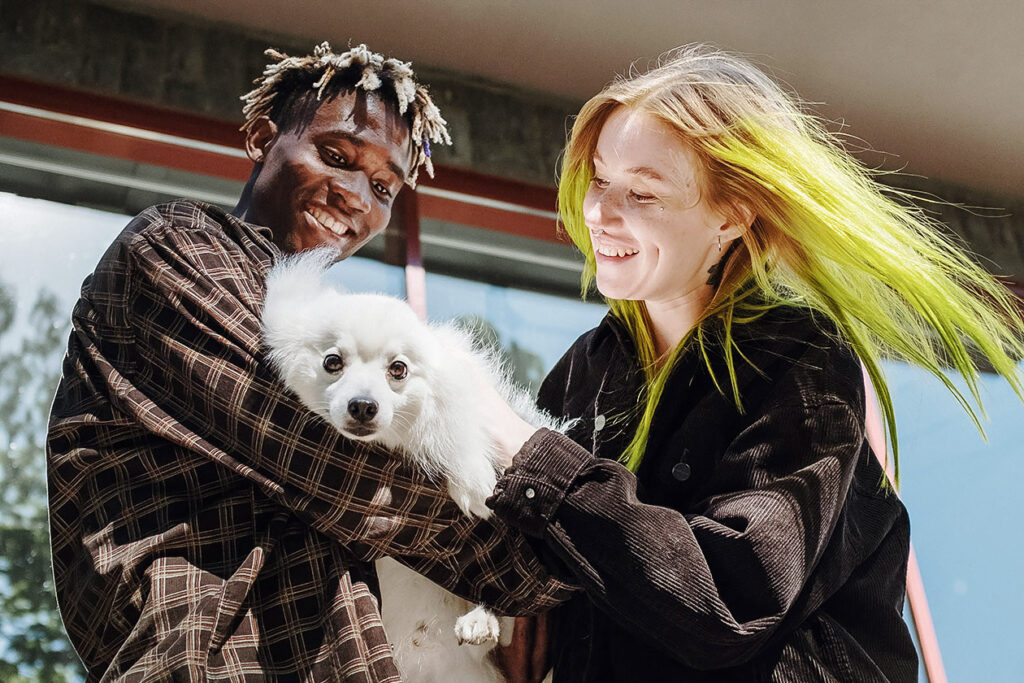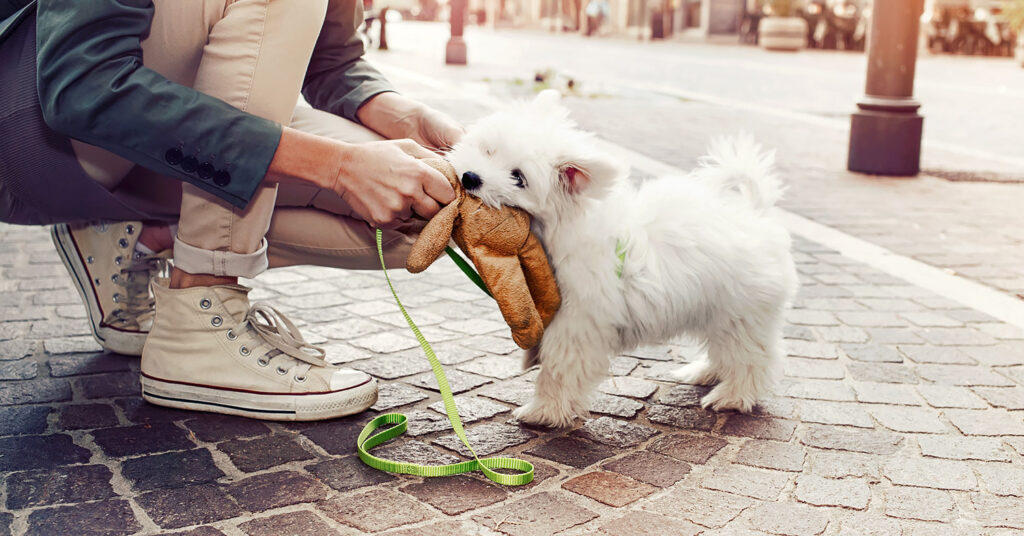I vividly remember the first time I met Gullah Blue. I was 23 years old and volunteering at my local animal shelter. After my two senior dogs passed away, I’d (naively) told myself I wouldn’t get another dog. But, missing the companionship that only a furry, four-legged pup can provide, I’d started giving complimentary walkies and treats to the homeless dogs of Orlando, Florida, where I lived at the time.
On this particular day—June 2, 2014, to be exact—the shelter had held an adoption special and all the kennels had bright yellow “I’ve been adopted” stickers placed on their doors. All, that is, but one.
The one-year-old blue nose pit bull was mange-ridden and nearly hairless. Her kennel lacked the yellow sticker of her peers. She sat close to the door of the cage looking forlorn. But her face lit up when I stuck my hand out to her. It was love at first sight. And I was determined to bring Gullah home.
Of the millions of companion animals entering shelters each year, about 920,000 are euthanized. The majority of these—530,000—are cats. And while this figure is a decrease from previous years (2011 saw 2.6 million animals euthanized), it’s still jarring. Due to overcrowding or a lack of resources, some shelters must resort to euthanizing the animals that aren’t adopted out in a timely manner.
Adopting is a great way to rescue shelter animals from this fate. But it’s not without its challenges. Bringing a new animal home—particularly one who may have suffered abuse, is afraid, sick, and a bit disoriented—is a huge responsibility, so it’s important to be prepared. This will not only help ease the burden on you, but helps ensure a successful future for your pet. As many look to bring home pets for the holidays, it’s critical to remember: adoption is about ethics, not love.

Adopting Gullah Blue
Gullah had a lot of health issues. In addition to mange, she had a grade-four heart murmur, which would require medications and a specialized diet. The woman handling the adoption paperwork tried to talk me out of getting her. “Are you sure you want to take this one? She has mange,” the woman said. I was shocked that a skin disease would make a dog “undesirable.” After all, I have eczema. “Of course,” I said. I was determined not to fail Gullah, but the road ahead wouldn’t be easy.
As Gullah settled into the backseat of my car on the drive home, the realization that I wasn’t quite prepared for her set in. I needed to make an appointment with the vet to get her on mange medication. I had to work the next day, so she’d be left alone at home. I hadn’t even had time to pick her up some toys. Leaving her home alone resulted in her tearing the door frame off my front door. Her dog bed was also torn to shreds. And she pooped all. over. my. carpet. Even with all my many years of experience caring for dogs, I wish I’d been better prepared. Those first few days would have been easier… for both of us.
My adoption story has a happy ending. As I type this, Gullah is serenely nestled into her oversized dog bed, blissfully snoring away. She’s eight, so we’ve been kicking it for seven years now. Her mange has cleared, her anxiety has eased, and she is undoubtedly my best friend. Sure, she’s got a few quirks—most notably, the heavy snoring. She also poops in a circle, frequently stepping in her own turds when she makes that 360-degree turn. But I still love her.
Of course, I don’t regret adopting Gullah. She is the peanut butter to my marmalade. But taking her home on a whim, certainly presented challenges. So if I had to do it all over again, I would have done more research. Like me, many don’t do their due diligence. And the stress of adopting a new pet without proper preparation can lead to the worst result of all: pets being returned to shelters.

Pet adoption 101
According to a 2012 study by the American Humane’s Animal Welfare Research Institute, between 7 percent and 20 percent of dogs and cats are returned to shelters within the first six months of their adoption. These figures don’t include pets that were given away to a new home.
Most people prepare for other key life decisions. E.g., buying a car, starting a new job, having a baby. Adopting a pet should be no different. This is why the decision to adopt a pet shouldn’t be made on a whim.
Learning how to ethically adopt an animal is more urgent than ever. According to the American Society for the Prevention of Cruelty to Animals, more than six million dogs and cats enter U.S. animal shelters each year. Some are strays, some are surrendered. Reasons for the latter can run the gamut from housing restrictions and the cost of maintaining a pet to not having enough time to spend with them.
So, with all the dogs and cats filling up shelters, it seems like a no-brainer to gift them for the holidays, right? Well, not so fast. There’s no definitive data as to which times of year see the most surrendered pets. But some shelters have reported an uptick in pets returned after the holiday season. On the contrary, according to a 2013 study conducted by the ASPCA, in general, gifted pets are not more at risk of being abandoned. The study found that 86 percent of respondents who had received a cat or dog as a gift kept the animal.
So, how do you ethically adopt a pet?
Regardless, if you’re thinking about gifting a pet over the holidays, it’s best to check with the person first. This will help reduce the likelihood that they will have to surrender the pet. If you’re looking to add a lucky companion animal to your own family this holiday season, here’s how to do it ethically.

Consider all of your needs
Before adding a pet to your family, answer the following questions: How much time do you have to care for a pet? Can you afford all animal expenses, including food, toys, doggy daycare, veterinary care, etc.? Do you already have pets that would need to adjust to the new one? Do you travel a lot, and can you afford to pay for a pet sitter? Do you have enough time to spend with Fido? When I moved from Orlando to Los Angeles, I didn’t consider the fact there would be breed restrictions when looking for places to rent. So be sure to consider all of your needs, both in the present and in the future, before taking on the responsibility of a dog or cat.
“Prepare the items your pet will need in your home in advance. You should also make a plan with the human members of your household for the routine of your new pet,” explains Samantha Nelson, senior specialist of shelter outreach and policy engagement for the Humane Society of the United States. “Are there any rooms that are off limits? Will your pet be allowed on the furniture? Where will they rest at night? Who will be responsible for feeding the pet and how often?”
Nelson adds that if you already have pets, you’ll want to ensure they’re up to date on their shots before bringing another animal into your home. “You should also take extra care in planning their arrival and how you will introduce the new pet into your home,” she says.
If you’ve never taken care of a pet before, consider fostering an animal first. In addition to helping a dog in need, fostering can be a great way to get to know an animal’s real personality. Life behind a shelter’s bars can be a stressful environment for an animal, so a dog may not come out of his or her shell for several weeks. Fostering a dog will also help you learn what it takes to care for a pet long-term. And, you’ll also be able to see if you and the furry pooch are a great fit to make things permanent.
Nelson says foster homes are the backbone of many rescue groups. “The value of fosters can’t be overstated. They can be lifesavers for pets who can’t adapt to shelter life, those who need to be nursed back to health and orphaned kittens who need someone to step in for their mom.”

Do your research
Once you know your needs, do your research and find a dog or cat that is compatible with your lifestyle. Think of it like you’re trying to find a compatible roommate: Is their personality a good match for you? Are they calm or high-energy? Are they okay with children or other pets? You’ll also want to find out the animal’s medical and behavioral history. Like my Gullah, do they have any ongoing medical issues that will rack up high vet bills? Now, this is not to deter you from adopting an animal with a medical history, but a good reminder to be mindful as to whether or not you’ll be able to give the animal the proper care it requires.
“The shelter or rescue should be able to provide any veterinary information and documentation they have related to the pet you are adopting,” says Nelson. “It’s also important to remember that life with you is a different experience for your new companion, so give them time to adjust. You’ll soon find out that you’ve made a friend for life.”

Visit your local shelters
Once you’ve assessed your needs and done your research, visit local animal shelters and rescue centers to find a dog or cat that works for you. Take your time; there’s no need to rush. Spend time with the animal to better learn its behaviors. And if you have children, make sure they are able to interact with the animal before adopting. Your local animal shelter or rescue center will be able to help you find the right dog or cat to complement your life. For more information on adopting pets, click here.
“The holiday season can be a great time to bring a pet into your home with the right consideration and planning,” Nelson says. But, just like buying your first home or signing a lease to a new apartment, adopting a dog or cat should be preceded with much research and preparation. But once you do your due diligence, you’ll be well on your way to giving a homeless pet the forever, loving home it deserves—and finding your best friend.
The views expressed in opinion pieces are those of the author(s) and do not represent the policy or position of LIVEKINDLY.


